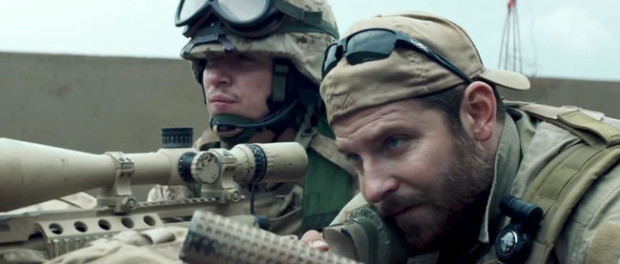Review: Pinpointing American Sniper’s Popularity
Article by Sarah Bemri
Six nominations for the Oscars (including best picture) and 247 million dollars in ticket sales (200$ in the US alone), American Sniper is THE movie everyone is talking about these days. The latest Clint Eastwood production starring Bradley Cooper is based on the autobiography of Chris Kyle, an American sniper during the Iraq invasion after the September 11 attacks. Kyle is considered as the most lethal sniper in US history as the Pentagon attributes 160 deaths to him while he claims 255.
Some are qualifying the movie as an American apology for patriotism and war. But that’s too easy.
So why the movie has done particularly well with men and in southern and Midwestern markets as in opposition to the east and west coasts?
Kyle is a man of few words, a gun-loving youngster raised in Texas. He is a normal guy until he decides to become a Navy Seal and be sent to Iraq. Although he detaches himself from any feelings that might interfere with his lethal mission, the spectator can see the inner conflicts he faces.
Kyle is trying to be the perfect husband and father, the perfect God-fearing human being doing a job of complete inhumanity and trying to be the perfect soldier. And he succeeds in the latter. For his fellows, Kyle is “the legend,” for the Iraqi people he is “Ramadi’s evil.” But after his return, Kyle is living a nightmare. His war trauma is keeping him from being the perfect father and husband he wants to be.
Eastwood is telling the story of this “war hero.” He is relating the facts as they are, as seen and lived by Chris Kyle. He is not taking sides. The whole movie is a reflection on the trauma experienced by soldiers. The spectator is watching the character fall apart after his missions.
Eastwood is initiating a thinking process that makes you question yourself about what’s wrong and what’s not and what drives a human being to dehumanize another human being in order to survive.
Clint Eastwood portrays Kyle’s loathsome side when he describes Iraqis as “Savage, despicable evil. That’s what we were fighting in Iraq” and his human, more likable side of a loving husband and father.
This movie has caused quite a bit of controversy! However, after having watched it, I can see the arguments from both perspectives and now understand that both points of view are justified which is the credit to Eastwood’s skill as a director.
I wouldn’t expect any less from Clint Eastwood.






